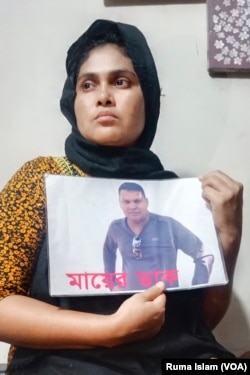Bangladeshis whose relatives went missing during the rule of former Prime Minister Sheikh Hasina are harboring new hope for an accounting or even the return of their loved ones following this week’s announcement by the country’s interim government that a commission will investigate hundreds of suspected enforced disappearances.
More than 700 people went missing under unexplained circumstances during Hasina’s 15 years in power, and dozens are still missing. Human rights groups and others say the nation’s security services are responsible, although the Hasina administration, which was ousted on August 5, always denied playing a role.
“With this commission of inquiry, Bangladesh has an opportunity to pursue justice for the victims of enforced disappearances and their families, many of whom have desperately sought answers, only to be dismissed, threatened, and humiliated by officials,” said Meenakshi Ganguly, deputy Asia director of Human Rights Watch, in a statement issued Wednesday, a day after the commission was announced.
Bangladesh does not have laws criminalizing enforced disappearance. However, the interim government established after Hasina’s ouster signed the instrument of accession to an international convention of the United Nations aiming to prevent enforced disappearances.
Over the past years, several global human rights groups released reports accusing the Hasina government’s security agencies of being involved in extrajudicial killings and enforced disappearances of opposition political activists and other dissidents.
According to Bangladeshi human rights group Odhikar, at least 708 people became victims of enforced disappearances during Hasina’s rule.
Among those who disappeared, some returned home alive, while others were found dead. According to different rights groups, around 150 suspected victims of enforced disappearance remain untraced.
The commission of inquiry — which is headed by a retired high court judge and includes another former judge, two human rights activists and a university teacher — has been tasked with investigating the circumstances under which victims went missing and tracing them.
The commission will submit its findings to the authorities and make recommendations on action, according to a notification issued Tuesday. It said the authorities would share related information about the enforced disappearance cases with the victims’ families.
The commission has been tasked to complete its investigations and submit its report within 45 working days.
Victims’ families welcome panel
Welcoming the formation of the commission, Sanjida Islam Tulee, coordinator of Mayer Daak — a platform for families of victims of enforced disappearances in Bangladesh — said that the process of investigation must be transparent.
“The investigation process must be fair and internationally acceptable. The investigation reports in all cases must be published or shared with the families of the victims. And the reports must not hide any of its actual findings,” Tulee told VOA.
Tulee’s brother Sajedul Islam Sumon, an opposition party leader, disappeared after some men allegedly from the paramilitary Rapid Action Battalion abducted him in Dhaka in 2013.
Ganguly of HRW said that the government “should seize the opportunity to create a robust process with international expertise, including forensics, to investigate these abuses and identify avenues for reparations in collaboration with victims and their families.”
Wednesday’s HRW statement said that the commission should investigate every case, regardless of whether the victim was returned, killed or still missing.
“It should be additionally mandated with identifying all clandestine detention centers, and the interim government should immediately shut them down and release anyone still being held in incommunicado custody,” the statement said.
“The commission should have the authority to make recommendations regarding the prosecution of suspects, reparations to victims and their families, the enactment of specific legislation, and institutional and other reforms that would prevent repetition of past violations.”
‘Police did nothing to trace him’
During the rule of Hasina’s Awami League party, rights groups and families of the enforced disappearance victims repeatedly urged police to investigate the cases. But the relatives complained that police did not investigate the cases properly.
Baby Akhtar, the wife of opposition activist Tarikul Islam Tara, told VOA that after her husband was picked up by plainclothesmen in Dhaka in 2012, she went to the police and other security agencies in search of him.
“Despite many appeals, the police did nothing to trace him. Two years ago, the police even sought to coerce me into issuing a statement that my husband had gone into hiding on his own and that I had falsely said that he was a victim of enforced disappearance,” Akhtar said.
“We are hopeful that the new commission will investigate all the cases well and try its best to find out all the missing persons, including my husband.”
Mohammad Ashrafuzzaman of the Capital Punishment Justice Project, which has been documenting rights violations in Bangladesh for more than 15 years, said the commission’s formation was long overdue.
“The victims of enforced disappearances had faced systemic denial of access to justice during the Sheikh Hasina regime. The families of the disappeared victims were hounded by the law enforcement agencies, security forces, intelligence units, and the ruling Awami League leaders,” Ashrafuzzaman told VOA.
“All the perpetrators — regardless of their political, military, bureaucratic, judicial and other professional portfolios — should be brought to justice within the shortest possible time.”
Angelita Baeyens, vice president of international advocacy and litigation at Robert F. Kennedy Human Rights, told VOA it was “encouraging” to see that the new interim government in Bangladesh has made the investigation and prevention of enforced disappearances a priority.
“The commission of inquiry has a monumental task ahead, especially because there are still perpetrators in high places that will do anything they can to secure continued impunity,” Baeyens said. “But we hope it is a successful effort and that the victims can finally find answers.”



